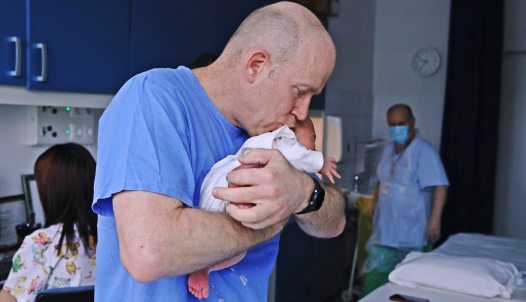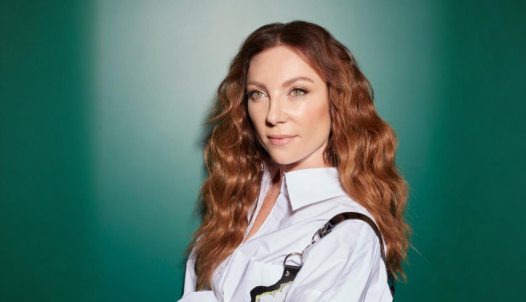Dr. Balázs Bálint: "I'm liberal in the delivery room, conservative on abortion"
Following his father's, Dr. Sándor Bálint's footsteps, he has been at the forefront of family-friendly obstetrics. He has recently been working to promote natural methods of infertility treatment and is the professional director of Hungary's first fertility centre, besides working on the possibilities of giving birth without interventions. As a man of faith, Dr Balázs Bálint has strong opinions on a number of issues that are very divisive. He avoids caesarean sections and IVF whenever possible, and does not perform abortions for reasons of conscience. Although he accepts that others may have different views, he does not hide his own.

- In October 2020, the debate over IVF was reignited, due to the Catholic Church's rejection of all forms of artificial reproductive techniques. What are your views on this issue?
- I'm in a lucky position because I can see the truth of both sides. Scientifically speaking, IVF is a great achievement, but as a man of faith, I am concerned about what happens to the deep-frozen, unused embryos during the process of artificial insemination. I cannot resolve this dilemma at the moment, so I will not go into it in any depth, but will instead tell you what I would like to see, what the solution could be: the establishment of a fertility centre (I deliberately do not call it an infertility centre) where the causes that prevent conception are treated and cured. Unlike in the case of IVF, the problem is not bypassed, but the two branches of so-called restorative medicine, NaPro and FEMM, follow protocols that enable future mothers and fathers to conceive without any artificial intervention. At the Irgalmasrendi Hospital in Buda, we are currently doing this on a small scale, with a waiting list of several months, but we are already working hard to increase capacity.
In the first three years of our work, we were able to help about a third of the couples who came to us. IVF is similarly effective, but there are a lot of health risks for the baby and the mother.
In the past, when I didn't know about these natural methods, I used to refer couples to fertility clinics, but I don't do that anymore. However, we do not engage in counter-propaganda, it is everyone's right to choose between the two.
– How do the NaPro and FEMM protocols differ from a traditional gynaecological examination?
In the Christian Family Centre of the Irgalmasrendi Hospital in Buda, we examine patients more comprehensively than is possible in private practice. In addition to gynaecologists, we have endocrinologists, haematologists, immunologists, male infertility andrologists working in this specialised outpatient clinic, so we can treat the problem holistically, in cooperation with each other.
Both NaPro and FEMM are based on observations of the cervix, which indicates hormonal changes in the female cycle. This, unlike the uncertain "calendar method", can be used to calculate the exact fertile days of the cycle and "see" when ovulation is not occurring. To give you an example: to be aware of the hormonal changes in the female cycle, it is a standard gynaecological practice to have two blood tests, one at the beginning of the cycle, between days 3-5, and one somewhere in the second half, and this is a much more complicated matter. It should be done after ovulation but before menstruation, preferably 7 days after ovulation. It is not so clear when ovulation occurs if we don't follow the body's signals. Each cycle is different, some menstruate every 23 days, others every 35 days, but ovulation does not necessarily occur every month.
Therefore it's not at all certain that it's a good idea to take a second blood sample on day 21 of the cycle, although this is generally what happens.
Using so-called cycle-tracking methods, which are based on monitoring signals from changes in mucus, body temperature, i.e. hormone levels, it is possible to calculate exactly on which day a second blood test should be done to draw accurate conclusions about how the body is functioning.
- What divides public opinion even more than IVF is the issue of abortion. The news of the tightening of Polish legislation on abortion last October caused a major stir not only in Poland but also here in Hungary. What is your position on abortion?
- We live in a world where the interest of the individual overrides the interest of another person or the community. This is liberalism. But I, as a man of faith, take the conservative side on this issue, as opposed to my obstetric position, because I am infinitely liberal on that.
For me, the interest of the community comes before the interest of the individual, and the interest of the community is to have as many children as possible.
I also believe that the foetus’s right to life is stronger than the right of self-determination of the mother. As a doctor, I have no right to decide who is entitled to live and who is not. The good thing is that in Hungary today there is freedom in this respect, too, and the doctor can decide whether or not to perform an abortion. I do not, and thank God there are many of us for whom life begins not at birth but conception. In any case, in my opinion, the Hungarian legislation is too liberal in terms of abortion, since pregnancy can be terminated up to the 12th week on the grounds of the mother's 'crisis', which is a very broad category.
- Have you ever met a pregnant woman in crisis?
-Yes, I met a lot. I do not have the right to persuade anyone to do this or that, but surely no one can forbid me from outlining the aspects that should be considered before making such a huge decision. In general, mothers do not forget once they have decided to abort their child, no matter how much thought they put into their decision. It is very touching when my patients who have finally decided to have a baby send me a baby photo with a simple "thank you" on it.
- How did your colleagues take your decision not to perform abortions?
- When, as a junior doctor, I indicated that I would not abort a foetus, some resented me for it, saying that I was pulling myself out of these ugly things. Yes, I am pulling myself out of these ugly things.
I don't know any colleagues who perform abortions without blinking an eye, yet many do, out of a sense of duty, even though they have as much choice as I do not to.
- Those who argue for the mother's right to self-determination claim, among other things, that no one should be obliged to raise a disabled child. Do you think the right to life of, say, a child with Down's syndrome is stronger in such a case? According to the Polish Constitutional Court, yes.
- The Bible, and the law for that matter, "speak" of the right to life, not the right to a healthy life. From this point of view, the answer to the question is "easy", but when it comes to the question of whether one can be obliged to take on such a spiritual and financial burden, the answer is not so clear-cut. If a state makes it mandatory to have these children, then I think it should also give them maximum assistance. My position is therefore that those who have been given life should be allowed to be born. To get the overall picture, it is important to know that abortions due to foetal abnormalities account for only a fraction of all abortions and that there are many more cases where a perfectly healthy foetus is aborted. Going back to the beginning of our discussion, natural family planning could also be a remedy for this problem, as cycle-tracking methods are also an excellent way of avoiding unwanted pregnancies. So, by teaching women, with the help of professionals, to understand how their own bodies work, the number of abortions could be significantly reduced.








